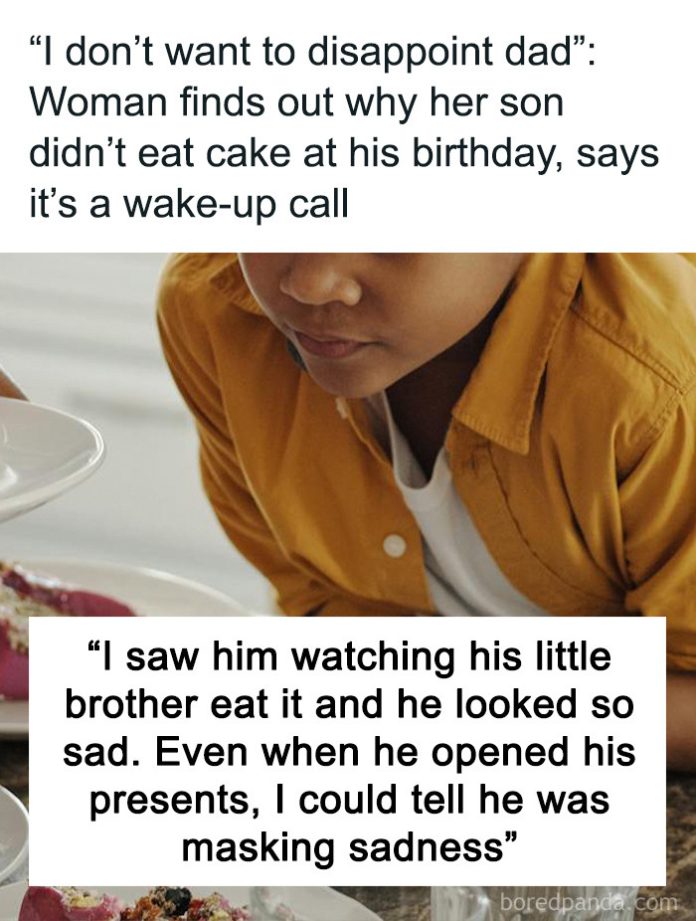In today’s health-conscious society, the pursuit of fitness and well-being is often encouraged and celebrated. However, when this pursuit becomes an obsession, it can have unintended consequences, especially within family dynamics. A recent incident highlights the potential negative impact of a parent’s extreme fitness regimen on their child’s relationship with food and overall well-being.
In this particular case, a father, deeply committed to his fitness journey, imposed strict dietary restrictions on his household. His dedication to maintaining a lean physique led him to eliminate foods he deemed unhealthy, including treats like cake. While his intentions were rooted in promoting health, the rigidity of his approach began to affect his young son.
During a family gathering, the child was offered a slice of cake. To the surprise of relatives, he declined, stating that his father doesn’t allow him to eat such foods. This revelation sparked concern among family members, prompting discussions about the potential implications of the father’s stringent dietary rules on his son’s developing relationship with food.

Experts warn that an overly restrictive diet, especially when imposed on children, can lead to unhealthy attitudes toward food. Dr. Darcey Thornton, a pediatrician specializing in adolescent medicine, notes that while healthy eating is beneficial, an obsessive focus on consuming only “pure” or “perfect” foods can be detrimental. This condition, known as orthorexia, involves an excessive preoccupation with avoiding foods perceived as unhealthy, potentially leading to nutritional deficiencies and social isolation. Thornton emphasizes that children and teens exhibiting signs of this disordered eating may develop obsessive concerns about eating the most “pure, perfect, or healthful” foods, impacting their everyday life.
The father’s approach, though well-intentioned, may inadvertently foster a restrictive mindset in his son. Children are impressionable and often model their behaviors after their parents. When they observe a parent categorizing foods as strictly “good” or “bad,” they may internalize these labels, leading to anxiety or guilt associated with certain foods. This black-and-white thinking can disrupt a child’s ability to develop a balanced and healthy relationship with food.
Moreover, imposing such dietary restrictions can affect a child’s social interactions. Food is often central to social gatherings and celebrations. A child who feels unable to partake in communal eating experiences may experience feelings of exclusion or embarrassment. Over time, this can lead to social withdrawal or a sense of isolation.
It’s essential to recognize the difference between encouraging healthy eating habits and enforcing a restrictive diet. While it’s beneficial to educate children about nutrition and the importance of a balanced diet, it’s equally important to allow them the flexibility to enjoy a variety of foods, including occasional treats. This balanced approach helps children develop a healthy relationship with food, free from fear or guilt.
Parents should also be mindful of the language they use when discussing food and body image. Negative comments about certain foods or one’s own body can influence a child’s self-perception and eating habits. Promoting a positive body image and a non-restrictive approach to eating can foster a healthier environment for children to grow and thrive.

In situations where a parent’s fitness or dietary habits begin to impact their child’s well-being, it’s crucial to seek guidance. Consulting with a pediatrician or a registered dietitian can provide valuable insights into establishing healthy family eating practices. These professionals can offer strategies to balance nutritional goals with the need for flexibility, ensuring that children receive adequate nourishment without developing negative associations with food.
In conclusion, while the pursuit of health and fitness is commendable, it’s important to approach it with balance and mindfulness, especially when children are involved. Encouraging healthy habits without imposing rigid restrictions allows children to develop a positive and balanced relationship with food, promoting both their physical and emotional well-being.

















